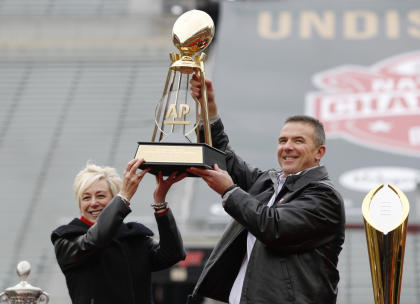SEC feeling college football recruiting heat due to Big Ten's attempted talent raids
From the days of Reconstruction, Southerners have not always reacted kindly to Northern interlopers. “Carpetbaggers” was hardly a term of endearment.
The stakes are far less serious now than they were then, but college football coaches from the Southeastern and Atlantic Coast conferences may feel similarly regarding Yankee invaders.

For the second consecutive summer, Penn State coaches are crossing the Mason-Dixon Line to work satellite football camps designed to raid the local talent. Last year they were in Atlanta and central Florida; this year the locales are Charlotte, N.C. and Norfolk, Va. The Nittany Lions have company from the Big Ten this time – Jim Harbaugh and the Michigan coach staff is going satellite camping in Alabama, Florida and Texas.
Last week Ohio State coach Urban Meyer clucked his tongue and shook his head over these Dixie dives through a Big Ten loophole, which allows schools to work far-flung camps that the SEC and ACC forbid. Then he said his program may follow suit.
“I think that should be outlawed,” Meyer said in one breath. Shortly thereafter: “If it helps us, we’ll do it. And I think we might try one this year.”
Satellite camps are not a new idea. Yahoo Sports wrote about Oklahoma State working this loophole in Texas nearly two years ago. But it is an idea gaining popularity, even in the one conference that has been historically timid when it comes to pushing the envelope.
Not now.
This is the radically re-energized Big Ten – a league in transition from stubbornly traditional to aggressively proactive. It began when former SEC coach Meyer was hired at Ohio State in 2012, accelerated when former SEC coach James Franklin went to Penn State last year, hit another gear when the Buckeyes won the national title in January and has reached a new level with former NFL coach Harbaugh spiking the punch at Michigan.
The latest outgrowth of this new attitude is the satellite camps. And those make the conferences that had won the previous eight national titles (seven for the SEC, one for the ACC) a bit cranky.
Outgoing SEC commissioner Mike Slive joked Monday at a writers conference in Birmingham: “We are going to have a camp up at Penn State.”
Incoming SEC commissioner Greg Sankey followed up: “I'm not sure that the others want our coaches going to places like State College, Pennsylvania, because very clearly, if we do take the approach others have, they will go places and run those satellite camps, and it will certainly, I would expect, change the tone of the conversation.”
A prior Southern invasion of Pennsylvania (Gettysburg, to be precise) didn’t end well. But Sankey said his league’s preferred solution to this situation would not be SEC satellite camps in the north; it would be national legislation restricting camps to a school's own campus.
It is humorous to see the two conferences swapping roles to a degree. The SEC, sitting on its rich recruiting soil and long dismissive of the Big Ten, suddenly is threatened. The Big Ten, which has whined for years about the unfair advantages the SEC has, suddenly is emboldened.
Unsurprisingly, Sankey’s comments made their way north. They were met with something of a bring-it-on glee in some Big Ten outposts.
“We don’t mind stirring the pot,” said a staffer at one Big Ten school Monday.
But this isn’t just about rattling sabers and ruffling feathers. There are tangible reasons for Big Ten schools to recruit outside their area – and tangible reasons for the smaller schools that host the satellite camps to play ball.
At Davidson College just north of Charlotte, N.C., they’re wildly excited about bringing in Penn State coaches – and a few hundred players – to increase exposure to their non-scholarship FCS program. The big-time prospects will be there to be seen by the Nittany Lions; but the camp should also attract plenty of recruits who fit the Davidson profile.
“Anytime we have the opportunity to bring people on campus – student-athletes we’re recruiting, or coaches from different staffs – it can only help us,” head coach Paul Nichols said. “We have to cast a very broad net for people who can score a 30 on the ACT and play football. This helps in terms of getting a maximum number of prospects on our campus.
“Whether we have 500 kids here, 200 or 300, they’re going to leave here having had exposure to high-level coaching and to Davidson College. It’s win-win for everyone involved.”
It should be noted that this isn’t just a War of Northern Aggression. There also is some potential satellite in-fighting among Big Ten programs.
Michigan, for example, will attend a camp in Pennsylvania. And Penn State is the headliner on a five-staff camp in the Chicago suburb of Naperville, Ill., on June 15. That’s about 40 miles from Northwestern and less than 150 miles from the University of Illinois campus.
Division III North Central College is the site for that camp. In addition to the hosts and the Nittany Lions, coaches from Bowling Green, Ball State and Illinois State will be on hand. North Central coach Jeff Thorne said his staff sent out an email Friday to prospects about the camp, and over the weekend 30 players signed up.
“The benefits for us are huge,” Thorne said. “We get a lot of high school football players on our campus and they get a chance to meet our coaching staff. And it’s a cost-effective way for the kids to be exposed to coaches from different levels of football. People are pretty excited to hear Penn State and other D-I schools are going to be in Naperville.”
Southern coaches are demonstrably less excited by the presence of Penn State and Michigan staffs working camps in their backyards. But this is the new Big Ten, willing to take the fight into SEC and ACC’s backyard. Game on.